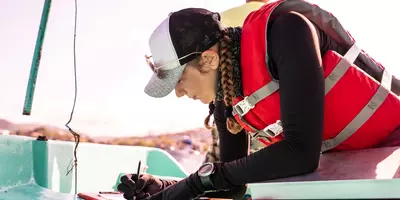
23 Sept 2024 ● Carly Fields
Bridging the gap for talent and inclusion
Done well, returner programmes can facilitate the return of experienced marine professionals after career breaks, unlocking a wealth of talent and fostering a more diverse workforce. Yet, while returner programmes may seem like a straightforward solution for talent-starved marine organisations, it is vital that a well-rounded approach is taken by organisations looking to welcome back professionals.
Speaking at an IMarEST webinar, Claire Goodall, equity consultant at STEM Returners, explained that integrating returning marine professionals requires a holistic strategy that acknowledges the normalcy of career breaks, driven by care of elderly relatives, childcare or a variety of other reasons. Businesses need to be prepared to support professionals returning from breaks, creating a welcoming environment that fosters their reintegration.
Supportive returner programmes benefit everyone in the organisation. By fostering a culture that welcomes career breaks and provides clear pathways for return, businesses create a sense of security for all current employees as well, encouraging them to take breaks for childcare, elderly relative care or other personal needs without fear of jeopardising their careers.
“Knowing that your organisation has a supportive softer landing for career break professionals could be very comforting, knowing that if you needed to ever take a career break yourself there is a mechanism for you to return in the right way,” Goodall said.
She acknowledged that most career breakers seek full-time opportunities. However, she emphasised the importance of offering flexible and part-time options. This allows individuals to re-enter the workforce at a pace that accommodates their personal circumstances.
“One of our returning professionals last year was an older professional. Having had a 30-year career in the oil and gas sector, he had to take a seven-year career break to care for his father, who regrettably then passed on. He was ready to return to work and was very interested in utilising his skills in the renewables sector, rather than oil and gas, where he felt his skills were very transferable."
“He did have the ability to work full-time, but we liked the idea of starting off part-time to begin with work while he regained his confidence. He also took some time to do some wraparound learning around new technologies that had come into play.”
“Most career break professionals do take the time to do courses, boot camps and keep themselves up to date”
Claire Goodall, equity consultant at STEM Returner
Workforce challenges
STEM Returners conducts annual research through its STEM Returners Index, surveying more than 1,000 career breakers. A key barrier identified in the latest Index was the lack of feedback on applications made through standard channels, be that through a perception of career break bias or deterioration of skill that comes with people being out of the workplace for extended periods of time – which is in fact rarely the case.
“Most career break professionals do take the time to do courses, boot camps, read industry press and keep themselves up to date with their industry because they are passionate about it and they enjoy it,” she said.
Outputs from the 2022 Index results showed that 33% of returning professionals felt recruitment bias. The UK engineering workforce remains overwhelmingly male and white (88% and 91% respectively). This lack of diversity can be isolating for those seeking representation within their teams and organisations. Goodall said that professionals from ethnic minorities are twice as likely to experience recruitment bias compared with other groups. This highlights the need for a multifaceted approach to diversity and inclusion, ensuring a welcoming environment for all.
The statistics revealed that while caregiving is the primary reason for career breaks (88%), only 12% take them by choice. Additionally, many professionals end up in underutilised roles outside their STEM fields while they are caregiving to maintain household income. “We work with an awful lot of professionals who have gone into professions like teaching who aren’t using their STEM skills and it’s a travesty. Really, the sector is missing out on those talented professionals,” Goodall said.
She shared the story of an engineer who excelled in an interview but was initially filtered out by a flawed recruitment process that focused too heavily on the latest technologies. A returner programme eventually provided her with the opportunity to showcase her core skills and extensive experience, leading to a permanent position. This story highlights the importance of mitigating bias within recruitment practices and recognising the value of experienced professionals, even after a career break, Goodall said.
Another barrier for career break professionals is perceptions of ageism. Ageism can be a real barrier for returning professionals, yet STEM Returners is starting to notice more professionals coming out of early retirement or continuing to work for longer. “Many of the organisations that we work with every day don’t struggle with diversity at a graduate level. They get great diversity in teams and they are really comfortable and established with what they’re doing around graduates and how they’re recruiting them. What they’re less confident with often is that mid-career level of recruitment,” she said. To mitigate this, Goodall advised that companies do not fixate on the latest technology knowledge in returners. Instead, “look for the transferable tech, business and engineering skills”.
Returner programmes offer a valuable bridge, ensuring that these individuals can seamlessly reintegrate into the STEM environment. As more marine organisations adopt returner programmes, the industry can tap into a valuable talent pool represented by experienced professionals seeking to re-enter the marine workforce.
This article was originally published in Marine Professional Issue 2/2024


